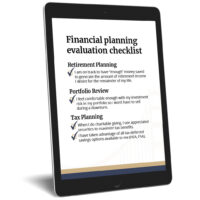
The myth of early retirement: 3 mindset mistakes hurting your future
Scroll down to watch our “New Age Retirement” webinar to learn more about the myth of early retirement.
How do you want the next chapter of your life to read? Well, as the authors of our own stories, it’s up to us to decide. But if we think the most compelling narrative is found in an early retirement, we may be in for an unpleasant surprise.
If we look to riveting novels for inspiration, we can uncover what makes for worthwhile journeys. What we find is that we’re attracted to characters who evolve in their knowledge, relationships, and influence inside the world(s) they inhabit. So when we’re writing the narrative of our own lives, we need to do the same.
Misconceptions of early retirement
Unfortunately, there are misconceptions around an early retirement that can cause our future selves to retract instead of expand, and stagnate instead of grow. We can fall into the trap of thinking an early retirement is the remedy to all of our stresses. And when we’re busy maxing out our income, growing our nest eggs, and preparing to launch our children, who could blame us?
But many of the ways we think about early retirement are quite flawed. So, let’s review some of the most common errors in thinking when it comes to building the lives we actually want.
# 1) Thinking a few years won’t make a big difference
It’s not a mystery that due to modern advances, people have the ability to live longer (and healthier) than ever before. And many are doing just that.
The average total life expectancy for Americans went up almost ten years between 1960 and 2015, from 69.7 to 79.4 years.1 And in places like San Francisco, the average is even higher at the age of 83.2 Furthermore, this trend of longer living is projected to continue with forecasts calling for as high as 85 nationwide by 2060.1
With the average retirement age in the U.S. at 64.6 for men and 62.3 for women..3 And for many, the desired age of retirement is even lower than the present averages. However, the combination a lower than average retirement age, and higher than average lifespan can create serious funding problems.3
The earlier you retire, and the longer you live, the more your savings will be stretched. This is especially true if you have no intention of scaling back the lifestyle you’ve grown accustomed to, and worked so hard to create. At The Advisory Group we performed an analysis of our midlife clients to see the likelihood of successfully funding their retirements in various scenarios.
Consider this example of a typical couple we may advise:
- Ages 45 and 50, and life expectancies of 98 and 95
- Two kids ages 10 and 12, with 529 savings plans for each
- Investment assets of $2.2 million (mostly tax-deferred), and house with mortgage
- Fully vested 401Ks with an additional $75,000 saved annually (after-tax)
The probability for a successful (i.e. fully funded) retirement is 90% when this couple plans to retire at age 67. But if they shoot for an early retirement at age 60, the odds of success drops to only 67%.
There’s nothing wrong with wanting to retire earlier (or live longer!). But problems can arise when we underestimate the costly gap between the two. A change of only a handful of years can severely impact your retirement success. But don’t think that means you can’t take a break.
# 2) Thinking you can’t take a long break
Burnout is real. Years of stressful decisions, hectic schedules, and constant deadlines, can take a toll. And when these pressures are in our everyday lives, the idea of walking away permanently can seem like the best solution.
Often, retirement is thought of completely leaving your career. But a much-needed break may serve you better in the long run. By stepping back from your work, you can rejuvenate yourself with very little sacrifice to your retirement’s success.
Earlier we explained that under our sample couple’s conditions, a decrease of 7 years in their retirement age would reduce their chances of success by 23%. But what if they took a full 18 months off between ages 60 and 67?
It turns out this would only reduce their chances of success by 3%, which would leave them with an overall likelihood of success of 87%.
When you consider the incredible boost to the overall strength of your retirement plan by simply taking a break, you may think twice about stopping work so early. A much needed break can provide you with the revitalization you need to work longer. And believe it or not, you’re going to want to keep working even after retirement.
# 3) Thinking stress stops when work does
To think of retirement as the end of work makes sense. After all, it’s the transition we undergo when we leave the career that’s taken most of our time and energy for decades. But the work probably won’t stop, instead it will likely shift to something else you value.
There’s hard science behind the need to be involved in productive outlets. This can be especially true in retirement, when there’s often a major shift in one’s daily responsibilities. Consider the following:
- A Federal Reserve study in 2016 focused on those who took an early retirement or left work due to burnout. In one study, 30% of respondents returned to work after retiring. Research suggested that these individuals did not see retirement as the end of work itself, or simply did not enjoy not working.4
- The same Federal Reserve study also examined respondent attitudes toward continuing to work even if income wasn’t a factor. The vast majority (over 68%) either “agreed” or “strongly agreed” with the notion that they would continue to work even if income wasn’t necessary.4
The fantasy of early retirement can be detrimental to your health if you’re not prepared with alternative ways to invest your time. That’s because retirement is just as much about working on something new as it is about stepping away from the work you’ve already done.
Whether it’s competing in an Ironman race, starting a new business, volunteering your time, or adding more “life” into your work-life balance, you need to remain active and growing to stay healthy. Simply put, you’re only continuing to grow even as you transition into full retirement and being secure in your financial life allows that growth to continue.
# 4) Thinking you have to plan it all yourself (bonus)
You’ve worked incredibly hard to build your wealth, and it can feel overwhelming when you try to make decisions about how to best use your resources to create what’s next in your life.
But it doesn’t have to…
At The Advisory Group we specialize in helping business owners and professionals stay on top. Our process takes advantage of the Wealth & Life strategy to ensure your financial decisions are properly aligned with your vision of the future.
If you’re ready to take the pressure out of planning what’s next, or simply want a new perspective from an advisor who’s been there before, set up a complimentary consultation. You’ve already worked hard to build something worthwhile, let’s make sure that success brings you the life you seek.
Resources:
- https://www.census.gov/content/dam/Census/library/publications/2020/demo/p25-1145.pdf
- https://sf.gov/data/health-disparities-dashboard#:~:text=Overall%20Life%20Expectancy%20is%20high,Francisco%20has%20decreased%20since%202014
- https://www.investopedia.com/retirement/when-should-i-retire-pros-and-cons-different-ages/
- https://www.federalreserve.gov/econresdata/feds/2016/files/2016053pap.pdf
The information provided herein is for informative and educational purposes only. The use of hyperlinks to third party websites is not an endorsement of the third party. Third party content has not been independently verified. To understand how this content may apply to you, please contact a financial advisor.






